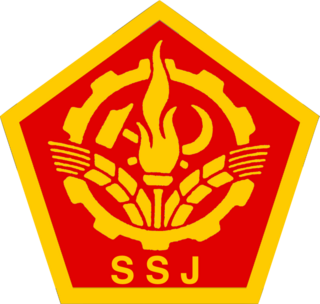
The World Federation of Trade Unions (WFTU) is an international federation of trade unions established in 1945. Founded in the immediate aftermath of World War Two, the organization built on the pre-war legacy of the International Federation of Trade Unions as a single structure for trade unions world-wide, following the World Trade Union Conference in London, United Kingdom.
A confederation is a political union of sovereign states united for purposes of common action. Usually created by a treaty, confederations of states tend to be established for dealing with critical issues, such as defence, foreign relations, internal trade or currency, with the central government being required to provide support for all its members. Confederalism represents a main form of intergovernmentalism, defined as any form of interaction around states that takes place on the basis of sovereign independence or government.

The General Confederation of Labour is a national trade union center, founded in 1895 in the city of Limoges. It is the first of the five major French confederations of trade unions.

The Norwegian Confederation of Trade Unions is a national trade union center, decidedly the largest and probably the most influential umbrella organization of labour unions in Norway. The 21 national unions affiliated to the LO have almost 1,000,000 members of a Norwegian population of 5 million. The majority of affiliated unions organizes traditional blue collar workers, but the largest affiliate is the Norwegian Union of Municipal and General Employees which makes up more than a third of all members. LO is affiliated to the ITUC and the ETUC.
A national trade union center is a federation or confederation of trade unions in a country. Nearly every country in the world has a national trade union center, and many have more than one. In some regions, such as the Nordic countries, different centers exist on a sectoral basis, for example, for blue collar workers and professionals.

The Swedish Trade Union Confederation, commonly referred to as LO, is a national trade union centre, an umbrella organisation for fourteen Swedish trade unions that organise mainly "blue-collar" workers. The Confederation, which gathers around 1.5 million employees out of Sweden's 10 million people population, was founded in 1898 by blue-collar unions on the initiative of the 1897 Scandinavian Labour Congress and the Swedish Social Democratic Party, which almost exclusively was made up by trade unions. In 2019 union density of Swedish blue-collar workers was 60%, a decline by seventeen percentage points since 2006 when blue-collar union density was 77%. A strong contributing factor was the considerably raised fees to union unemployment funds in January 2007 made by the new centre-right government.

The World Confederation of Labour (WCL) was an international labour organization founded in 1920 and based in Europe. Fascist governments of the 1930s repressed the federation and imprisoned many of its leaders, limiting operations until the end of World War II. In 2006 it became part of the International Trade Union Confederation (ITUC), ending its existence as an independent organization.

The European Trade Union Confederation (ETUC) is the major trade union organisation representing workers at the European level. In its role as a European social partner, the ETUC works both in a consulting role with the European Commission and negotiates agreements and work programmes with European employers. It coordinates the national and sectoral policies of its affiliates on social and economic matters, particularly in the framework of the EU institutional processes, including European economic governance and the EU Semester.

The Federation of Unions of South Africa (FEDUSA) is the second largest national trade union center in South Africa.

The National Council of Trade Unions (NACTU) is a national trade union center in South Africa.

The International Trade Union Confederation (ITUC) is the world's largest trade union federation.

The World Organization of Workers (WOW) is an international trade union federation.
Trade unions in Norway first emerged with the efforts of Marcus Thrane and the formation of the Drammen Labour Union in 1848 which organised agricultural workers and crofters. However, with Thrane's imprisonment and the suppression of the union in 1855, it was not until 1872 before a union was founded again, by print workers. In 1899 the first national federation, the LO, was founded. During this period interactions with trade unions in Denmark and Sweden played a great influence over the development of trade unions in Norway.

The Confederation of Trade Unions of Yugoslavia (SSJ) was a mass organization in SFR Yugoslavia that operated as both a centralized body of trade unions and a socio-political organ of the Yugoslav government. It existed as one of the most powerful organizations within the Socialist Alliance of Working People of Yugoslavia, the popular front of the ruling League of Communists. In addition to assisting in the implementation of the Party's domestic labor programs, the SSJ actively sent labor delegations abroad to other countries, with 190 such delegations having been sent in the year 1959 alone. The organization maintained relations with both Western and Eastern labor unions and represented Yugoslavia at the International Labour Organization.










